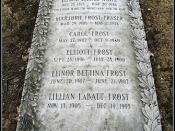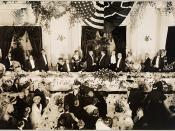Blindness is a medical condition that affects many. They are unable to see the world around them. Even people with perfect sight can be "blind" as they fail to "see" the truth before them. In the short story "Cathedral" by Raymond Carver, the narrator (also referred to as the husband) is "blind" despite his perfect vision. This blindness can be seen through his actions towards Robert, the physically blind man. The husband is unable to "see" or to understand that Robert's disability does not change who he is as a person. The narrator is made uncomfortable by "this blind man," because he is unsure of how to act around him. However, as the story progresses, it can be seen that a change in the husband has taken place; he is able to see Robert as a regular person and no longer just a blind man.
Although he has perfect eyesight, the narrator is blinded by his perception of the blind people.
While Robert is physically blind, the husband is the truly blind one. Before Robert comes to visit, the husband constantly refers to him as "the blind man." He never calls Robert by his first name. This displays the narrator's inability to relate to Robert as a person. He just views Robert as a disabled man. Also, "[his] idea of blindness comes from the movies. In the movies, the blind moved slowly and never laughed. Sometimes they were led by seeing-eye dogs." (110) The narrator has a distorted perception of the blind, which is mostly untrue.
When his wife informs him of Robert's visit, he is not at all thrilled with the idea. He does not have much choice though as it is his wife's friend. Once Robert arrives at the couple's home, the husband is unsure...


